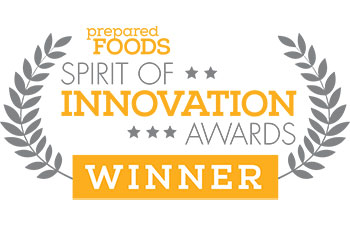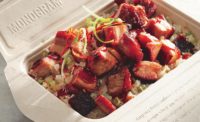SPIRIT OF INNOVATION AWARD WINNER
Happy Little Plants Meatballs Address Consumer Trends in Foodservice
Hormel Foods’ Happy Little Plants business captures authentic Italian flavor, texture in a plant-forward meatball that pleases both foodservice operators and restaurant patrons

It took Hormel Foods about two and half years to develop Happy Little Plants Meatballs, one of the foodservice industry’s first plant-based meatball products. Hormel launched the product last July and showcased it at this year’s National Restaurant Association exhibition.
PHOTO COURTESY OF: Happy Little Plants / Hormel Foods
When it comes to finalizing any worthwhile document—a lengthy contract or proposal—it’s critical to review and secure every detail. That process used to be called “dotting the i’s and crossing the t’s.”
Here’s a story where you could say the “i” stands for innovation and the “t’s” refer to taste and texture. It took Hormel Foods about two and half years to develop Happy Little Plants Meatballs, one of the foodservice industry’s first plant-based meatball products. Hormel launched the product last July and showcased it at this year’s National Restaurant Association exhibition.
The plant-based product’s taste, texture and on-trend appeal made it a 2021-2002 Prepared Foods Spirit of Innovation winner (“Best Foodservice Item / Front of House”) and it will be recognized this August 9 from 11.a.m.-1 p.m. EST in an industrywide webcast awards ceremony.
“Recent studies suggest that 35% to 40% of American consumers would like to add more plant-based foods and proteins to their diets. However, what they don’t want was to sacrifice taste,” notes
 FOODSERVICE FRONT OF HOUSE AWARD:
FOODSERVICE FRONT OF HOUSE AWARD: Hormel Foods’ Happy Little Plants Meatballs
Hormel Foods’ Happy Little Plants meatballs will be one of six noteworthy new products showcased this August in Prepared Foods’ Spirit of Innovation Awards.
Pre-register for this FREE industrywide event!
Anthony Panichelli, a Hormel senior brand manager. “Meanwhile, we knew our foodservice operator customers wanted a plant-forward product that was easy to handle and perform like it was meat based. Our Happy Little Plants team tapped more than 40 years of meatball making experience from the experts at Fontanini, another Hormel Foods subsidiary, and then we went to work. After so many months of testing and refinements we introduced a delicious, plant-forward meatball with cheese in July 2021.”
Hormel’s behind-the-scenes work seemingly involved several functional groups—especially those in R&D and operations in both Austin, Minn., and Fontanini’s facility in McCook, Ill. (west of Chicago).
For a gold standard product, Happy Little Plants brand team members and R&D team started by embracing Fontanini’s slogan, Una Bella Differenza (“a big difference”) and its classic Italian meatball formula.
“We added fresh garlic, fresh parsley, Romano and ricotta cheeses, a proprietary breadcrumb blend and soy protein,” notes Panichelli. “In fact, The Happy Little Plants product is made much like our regular meatball—as there is both a fat and lean component to it. It’s basically a plant-forward version of the Fontanini meatball that is authentic and true to form from a traditional standpoint, but it is 100% vegetarian.”
No less important than taste—is texture as well.
“This product had to ‘feel’ like you were eating a meat-based item,” Panichelli adds. “We had to make consumers believe they were eating a ‘real’ meatball. Bite appeal—how the product chewed and felt in your mouth—was a critical element to how this product performed. Once again, our wealth of meatball making experience allowed us to apply it to this unique restaurant offering in terms of look, feel and taste.”
Another critical factor, of course, is product performance in the restaurant kitchen.
“Our plant-forward meatballs do not perform the same way that a meat-based product does. A cross-functional team worked on product specification they could produce and replicate consistently over time while maintaining a high level of consistency,” Panichelli notes. “The last thing this product could do was leave a mess in our consumer's kitchens. After hours upon hours of testing and reformulation, we were able to perfect this product to a level consistent with a meatball made with actual meat.”
Happy Little Plants 1.5oz meatballs ship frozen and may be heated in the oven, under the broiler, or simmered in sauce. They come in two, 5lb bags per case.
Hormel packaging experts helped brand officials arrive at packaging that would protect the plant-based meatballs during cross-country shipping and on-site freezer storage. Hormel’s regulatory team also weighed in on product labeling and related applicable or non-applicable claims and language. Because of dairy-based ingredients, Hormel could not make a vegan claim, for example. However the product is vegetarian and marketed as “plant forward.”
“There were a lot of firsts with this project, but everyone worked together to create an incredible tasting, plant-based product,” Panichelli concludes. “Based upon performance and feedback, we believe we have fully delivered on a solution that meets the needs of both of these important stakeholders from a taste and handling viewpoint.”
Looking for a reprint of this article?
From high-res PDFs to custom plaques, order your copy today!






